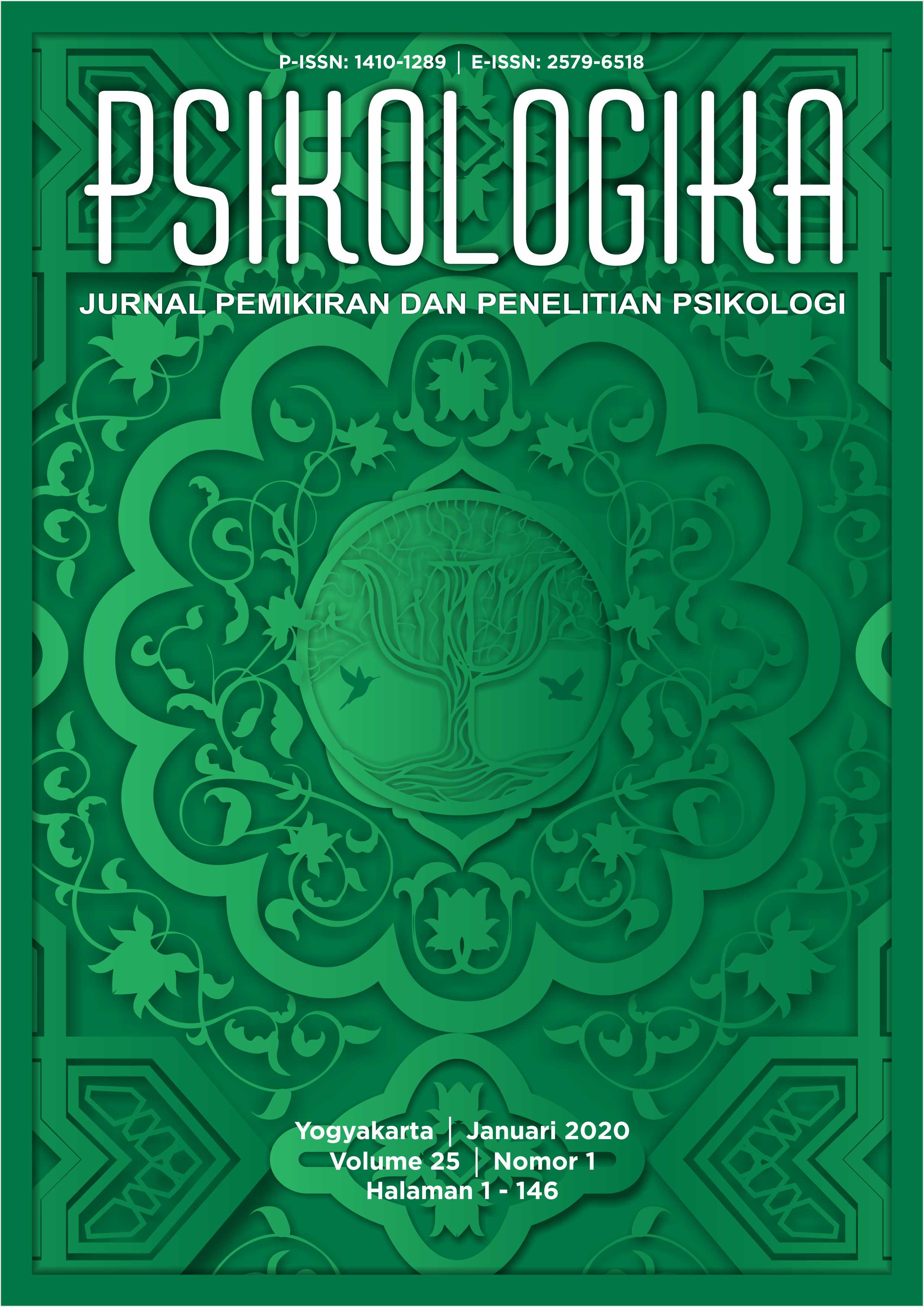Main Article Content
Abstract
Penelitian yang berfokus pada pengaruh dukungan sosial dan ketangguhan pribadi (hardiness) terhadap stres akulturasi masih perlu dikaji lebih lanjut. Hipotesis penelitian ini adalah adanya pengaruh simultan dan parsial antara dukungan sosial dan ketangguhan pribadi terhadap stres akulturasi pada mahasiswa perantau asal Nusa Tenggara Timur (NTT) di Salatiga. Alat ukur yang digunakan dalam penelitian ini adalah skala Stres Akulturasi, skala Ketangguhan Pribadi, dan skala Dukungan Sosial. Hasil pengumpulan data penelitian ini dianalisis menggunakan analisis regresi linier. Penelitian ini melibatkan 85 orang mahasiswa asal NTT. Hasil uji statistik menunjukkan bahwa secara simultan, ketangguhan pribadi dan dukungan sosial berpengaruh terhadap stres akulturasi dengan nilai F = 5.32 dan tingkat signifikansi 0,007 (p < .05); tampak secara parsial, ketangguhan pribadi tidak berpengaruh terhadap stres yang ditunjukkan dari nilai t = -1.74 dan p > .05. Di sisi lain, dukungan sosial memberikan pengaruh yang signifikan terhadap stres akulturasi yang ditunjukkan dari nilai t = -2.33 dan p < .05. Selanjutnya, berdasarkan analisis koefisien determinasi (R = .115), variabel ketangguhan pribadi dan dukungan sosial berpengaruh sebesar 11.50% terhadap stres akulturasi dengan sumbangan efektif variabel ketangguhan pribadi sebesar 4.39%, dukungan sosial sebesar 7.12%, dan sisanya sebesar 89.50% dipengaruhi oleh variabel lainnya yang tidak diteliti dalam penelitian ini. Hasil ini menunjukan bahwa dukungan sosial memiliki peran yang penting dalam menurukan stres akulturasi.
Kata Kunci: dukungan sosial, ketangguhan pribadi, stres akulturasi
Social Support, Hardiness, and Acculturation Stress among East Nusa Tenggara’s Students in Salatiga
Abstract. This research related to the influence between social support and hardiness on acculturative stress is still need to be examined further. The hypothesis of this study indicated that there was a simultaneous and partial influence between social support and hardiness on acculturative stress among overseas students from East Nusa Tenggara (NTT) in Salatiga. The data is collected by using Acculturation Stress scale, Hardiness scale, and Social Support scale as well as analyzed by linear regression analysis. This study involved 85 students from NTT. Statistical test results indicate that simultaneous hardiness and social support affect the acculturative stress with a value of F = 5.32 with a significance level of .007 (p < .05); and it appears that partially hardiness has no effect on stress as indicated by the value of t = -1.74 and p > .05. On the other hand, social support has a significant influence on acculturation stress as indicated by the value of t = -2.33 and p < .05. Furthermore, based on the analysis of the coefficient of determination (R = .115), hardiness and social support variables influence 11.50% on acculturative stress with an effective contribution of hardiness variables at 4.39%, social support at 7.12%, and the remaining 89.50% were influenced by other variables which were not examined in this study. The results indicate that social support contributed greater on acculturative stress compared to hardiness.
Keywords: hardiness, social support, stress acculturation
Article History:
Received 6 November 2019
Revised 24 February 2020
Accepted 30 May 2020
Article Details
Authors who publish with this journal agree to the following terms:
- Authors retain copyright and grant the journal right of first publication with the work simultaneously licensed under a Creative Commons Attribution-ShareAlike 4.0 International License that allows others to share the work with an acknowledgment of the work's authorship and initial publication in this journal.
- Authors are able to enter into separate, additional contractual arrangements for the non-exclusive distribution of the journal's published version of the work (e.g., post it to an institutional repository or publish it in a book), with an acknowledgment of its initial publication in this journal.
- Authors are permitted and encouraged to post their work online (e.g., in institutional repositories or on their website) prior to and during the submission process, as it can lead to productive exchanges, as well as earlier and greater citation of published work (See The Effect of Open Access).




